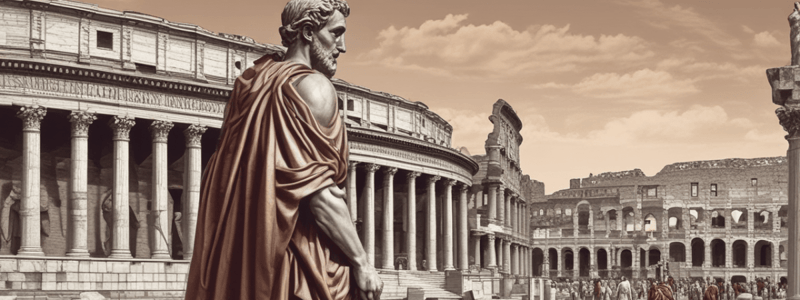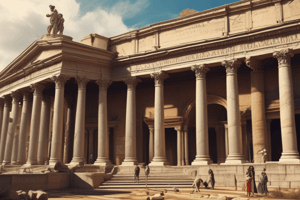Podcast
Questions and Answers
What was the primary responsibility of the Roman Senate?
What was the primary responsibility of the Roman Senate?
- Advising the consuls and overseeing foreign policy (correct)
- Commanding legions in battle
- Collecting taxes and managing the Roman treasury
- Judging legal disputes in Roman courts
Who was appointed to command the defense of Rome during the Roman Civil War?
Who was appointed to command the defense of Rome during the Roman Civil War?
- A Roman general
- Pompey (correct)
- Caesar
- A Roman consul
What was the symbolic significance of Caesar's crossing of the Rubicon River?
What was the symbolic significance of Caesar's crossing of the Rubicon River?
- It marked Caesar's defiance against the Senate and Pompey (correct)
- It marked the beginning of the Roman Empire
- It marked the end of the Roman Republic
- It marked the start of the Roman Civil War
What was the outcome of the Battle of Pharsalus?
What was the outcome of the Battle of Pharsalus?
What was the consequence of Caesar's refusal to disband his army?
What was the consequence of Caesar's refusal to disband his army?
Where did Pompey flee after being defeated by Caesar?
Where did Pompey flee after being defeated by Caesar?
Flashcards are hidden until you start studying
Study Notes
Pompey and Caesar
Roman Senate
- The Roman Senate was the governing body of the Roman Republic
- Comprised of patrician (noble) class members who held significant power and influence
- Responsible for advising the consuls, passing laws, and overseeing foreign policy
- Pompey, a prominent general and statesman, was a member of the Senate
- Caesar, a rising star in Roman politics, sought to reform the Senate and increase his own power
Roman Civil War
- The Roman Civil War (49-45 BCE) was a conflict between Pompey and Caesar
- Caesar, who had been consul in 59 BCE, was ordered by the Senate to disband his army and return to Rome as a private citizen
- Caesar refused, citing his rights as a victorious general, and led his legions across the Rubicon River into Italy
- Pompey, who had been appointed to command the defense of Rome, was defeated by Caesar at the Battle of Pharsalus (48 BCE)
- Caesar emerged victorious, becoming dictator of Rome, while Pompey fled to Egypt where he was eventually assassinated
Crossing the Rubicon
- The Rubicon River marked the boundary between Gaul (modern-day France) and Italy
- Caesar's crossing of the Rubicon with his legions was a symbolic act of defiance against the Senate and Pompey
- It was an unprecedented move, as a Roman general was not allowed to lead an army into Italy without permission from the Senate
- Caesar's action sparked the Roman Civil War, as he sought to gain control of Rome and overthrow Pompey
Studying That Suits You
Use AI to generate personalized quizzes and flashcards to suit your learning preferences.




